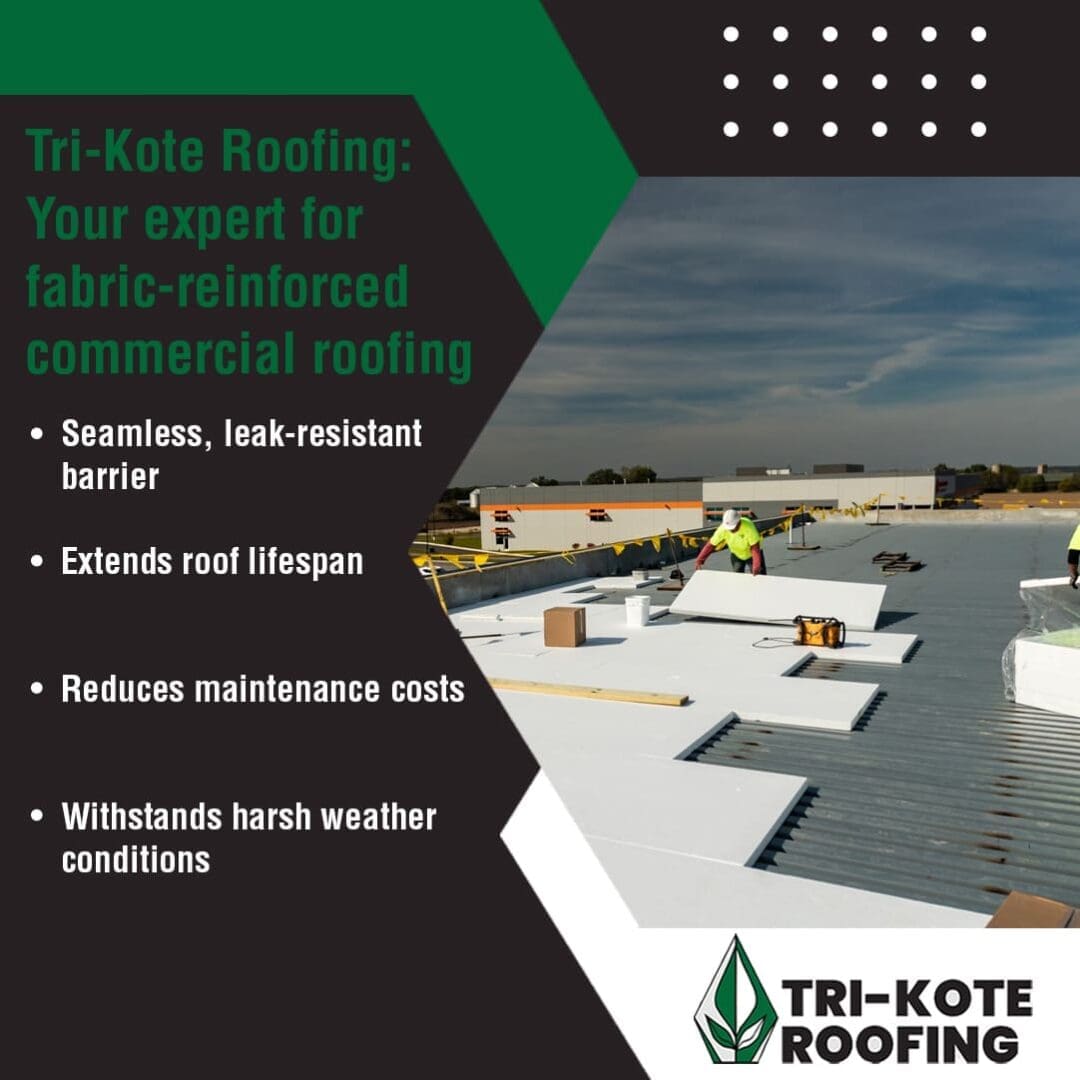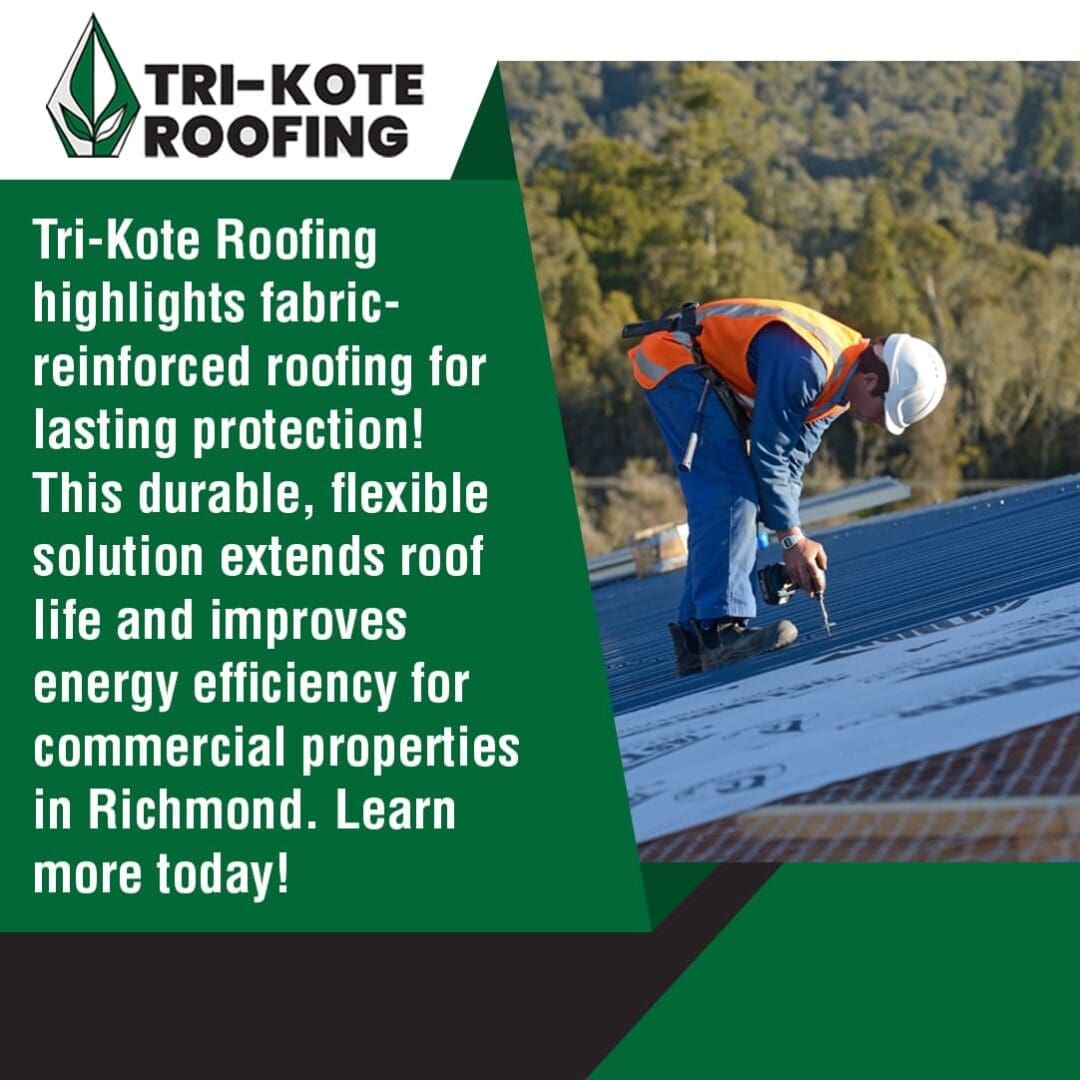Tri-Kote Roofing, based in Bedford, Ohio, is recognized among the top commercial roofing companies in Richmond and across the United States. With more than 20 years of experience, the company specializes in commercial roofing services designed to protect industrial and commercial facilities while lowering long-term costs. One of the most reliable options offered is fabric reinforced roofing, a system known for combining strength and flexibility to meet the demands of tough commercial roofs.
Businesses seeking durable and affordable commercial roofing services often turn to fabric reinforced systems. These systems extend roof life, reduce maintenance costs, and improve energy efficiency. Here, we’ll explain how the system works, why it is effective for large properties such as warehouses and office complexes, and how it delivers value compared to traditional roofing methods.
What is Fabric Reinforced Roofing?
Fabric reinforced roofing is a type of roof system that integrates a durable fabric layer with protective coatings. Fabric reinforced roofing combines flexible fabrics, often polyester or fiberglass, with elastomeric coatings to create a continuous, weather-resistant surface.
Unlike conventional roofing, it adjusts to building movements while minimizing leaks. Common types include TPO (thermoplastic polyolefin) reinforced membranes and EPDM (ethylene propylene diene monomer) with embedded fabrics, frequently used in industrial roofing services.
How Fabric and Coatings Work Together
The fabric distributes stress while coatings seal the roof surface. The embedded fabric prevents small cracks from spreading, while coatings create a water-resistant, UV-reflective barrier. For instance, commercial warehouses and manufacturing facilities can see energy savings with reflective topcoats. Businesses seeking affordable commercial roofing services often choose these systems for their balance of cost and longevity.

Differences Between Traditional and Fabric Reinforced Roofing
Traditional roofing relies on rigid materials, while fabric reinforced roofs are flexible and layered. Standard asphalt or metal roofing can crack when exposed to temperature fluctuations or structural shifts. Fabric reinforced roofs, by contrast, stretch and contract without compromising their structural integrity.
Working with top commercial roofing companies in Richmond provides access to expertly installed Fabric reinforced roofing systems. These systems are specifically designed for industrial and commercial buildings.
Advantages of Fabric Reinforced Roofing
Fabric reinforced roofing systems offer a combination of strength, flexibility, and cost-effectiveness, making them an ideal choice for commercial buildings. These systems are designed to address common roofing challenges while providing long-term benefits.
Leak-Resistant and Long-Lasting Protection
Fabric reinforced roofs minimize leaks and extend the roof’s lifespan. The integration of a durable fabric layer with protective coatings creates a seamless, waterproof barrier that resists punctures and water infiltration.
This design is particularly beneficial for industrial facilities, such as those with chemical storage, where maintaining a leak-free environment is essential. The enhanced durability of these systems contributes to a longer roof lifespan, reducing the frequency and cost of replacements.
Energy Efficiency and Reduced Maintenance Costs
These roofs improve energy efficiency and lower maintenance expenses. The reflective coatings commonly used in fabric reinforced roofing systems can considerably reduce heat absorption, leading to lower cooling costs.
Additionally, the seamless nature of these systems minimizes the potential for leaks and damage, thereby reducing the need for frequent maintenance. This combination of energy efficiency and low maintenance requirements makes fabric reinforced roofing a cost-effective solution for commercial buildings.
Ability to Withstand Harsh Weather Conditions
Fabric reinforced roofing resists wind, rain, hail, and temperature extremes. The flexibility and strength of the fabric layer allow the roofing system to adapt to building movements and environmental stresses without compromising its integrity.
This resilience is particularly advantageous for commercial buildings located in areas prone to severe weather conditions, ensuring consistent protection throughout the year.
Cost-Effective Roofing Solutions
Fabric reinforced systems offer affordable, long-term commercial roofing options. While the initial installation cost may vary, the extended lifespan and reduced maintenance needs of these systems contribute to lower overall roofing expenses.
For businesses seeking affordable commercial roofing services, fabric reinforced roofing provides a durable and economical solution that balances upfront costs with long-term savings.
Step-by-Step Fabric Reinforced Roofing Installation Process
Installing a fabric reinforced roofing system requires careful planning and execution to achieve long-lasting performance. The process combines structural assessment, precise material application, and finishing touches to create a reliable, durable roof.
Initial Consultation and Site Evaluation
Roofing specialists assess structural integrity and material needs. During this stage, the team measures roof dimensions, evaluates existing surfaces, and identifies any issues such as cracks, water damage, or weak spots.
This evaluation allows providers of industrial roofing services to customize the installation plan for each building. The result is a durable and tailored roofing solution.
Roof Surface Preparation
The roof must be cleaned, dried, and repaired before installation. Surface preparation is critical because the coatings must adhere to a stable, smooth base. This step involves removing debris, patching holes, and priming the roof surface. Thorough preparation reduces the risk of leaks and enhances the roof’s durability, which commercial roofing services consistently emphasize for long-term reliability.
Base Coat and Fabric Application
A base coat is applied, followed by the fabric reinforcement layer. The roofing fabric is embedded into the wet base coat. Overlapping seams are carefully applied to prevent water infiltration. This continuous, reinforced layer creates a strong barrier that resists punctures and distributes stress, offering industrial clients a resilient roofing solution.
Reflective Top Coat for Durability and Energy Efficiency
A final top coat provides UV protection and energy savings. Reflective finishes reduce heat absorption, helping control building temperatures and extending coating life. Many commercial buildings experience a roof lifespan increase of 10–15 years with a quality top coat. Affordable commercial roofing services often highlight this step for its energy-saving benefits and long-term cost reduction.
Final Inspection and Maintenance Recommendations
A thorough inspection confirms proper installation, and maintenance guidelines are provided. After installation, specialists review the roof for uniform coverage and seamless adhesion. They offer maintenance instructions, including periodic cleaning and minor touch-ups, to prevent premature wear and leaks. Regular upkeep allows the roof to perform effectively over its lifespan.
Applications in Industrial and Commercial Roofing Services
Fabric reinforced roofing offers practical solutions for a variety of commercial and industrial buildings. Its combination of strength and flexibility makes it suitable for structures that face both environmental and operational challenges.
Ideal Scenarios for Installation
Fabric reinforced roofing suits flat or low-slope commercial roofs. Buildings such as retail centers, warehouses, and distribution facilities benefit from its ability to adapt to minor surface irregularities. Industrial roofing services often recommend this system for facilities where consistent waterproofing and structural integrity are priorities.
Types of Commercial Buildings That Benefit Most
Warehouses, manufacturing plants, and office complexes gain the greatest benefit. The roofing system’s flexibility distributes stress across long-span metal or concrete roofs, preventing cracking.
Additional layers increase durability for rooftops housing HVAC units or areas with high foot traffic. Top commercial roofing companies in Richmond frequently use fabric reinforced membranes in such applications for both performance and longevity.
Integration with Existing Roof Structures
Fabric reinforced membranes can overlay existing roofing systems. Aging asphalt or single-ply membranes can receive a reinforced layer, reducing the cost and downtime associated with full tear-offs.
Properly prepared surfaces allow coatings to bond effectively, making this solution a practical option for clients seeking long-term reliability.

Why Tri-Kote Roofing Excels
Tri-Kote Roofing has built a strong reputation through its expertise, local knowledge, and tailored approach to commercial roofing services. Businesses across Richmond and the surrounding areas rely on our experience to maintain durable, long-lasting roofs. Our focus on industrial roofing services and fabric reinforced systems allows us to address the unique challenges of commercial properties.
Expertise in Commercial Roofing
Tri-Kote Roofing specializes in fabric reinforced and industrial roofing services. Our team is trained to handle installation, repair, and maintenance of reinforced roofing membranes for various commercial buildings, including warehouses, office buildings, and manufacturing plants. By working with multiple roofing systems, Tri-Kote Roofing provides solutions that maintain roof integrity under heavy use and harsh conditions.
For example, warehouses with rooftop equipment or frequent foot traffic benefit from reinforced membranes that distribute weight and resist wear. Manufacturing facilities handling chemicals or sensitive materials receive coatings that protect the roof surface while preventing leaks. Our technicians focus on providing durable, flexible roofing solutions for long-term performance.
Local Knowledge
Tri-Kote combines industry expertise with Richmond-specific insight. Knowing the local climate is essential for commercial roofing services. High humidity, seasonal storms, and temperature fluctuations all influence roof performance. Tri-Kote Roofing uses this knowledge to guide material selection and installation practices, helping roofs resist weather-related damage and extend their lifespan.
Commercial property owners can trust that solutions are suited for the area’s environmental conditions. This localized approach distinguishes us from other providers that may rely solely on general industry standards.
Customized Solutions
We tailor roofing solutions to each client’s building requirements. Factories with chemical storage facilities may receive membranes with chemical-resistant coatings, while retail centers can benefit from reflective topcoats that reduce energy use. This approach allows property owners access to affordable commercial roofing services without compromising on quality.
By providing solutions adapted to each building’s needs, Tri-Kote Roofing helps clients maintain functional and durable roofs while managing long-term costs. Our combination of experience, local insight, and customized offerings makes us one of the top commercial roofing companies in Richmond.
Protect Your Commercial Roof with Tri-Kote Roofing!
Trust Tri-Kote Roofing for durable, cost-effective, and expertly installed commercial and industrial roofing services. Reach out today at (440) 635-6285 or email andrew@trikoteroofing.com to discuss your project or schedule a consultation. Get the roofing solutions your business deserves and keep your property secure for years to come.

